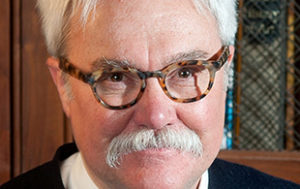Bill Peak is the Communications Manager and all-encompassing “Library Guy” at the Talbot County Free Library on Maryland’s Eastern Shore. He is the author of the novel The Oblate’s Confession (2014). Bill writes a monthly article for The Star-Democrat about working at the Talbot County Free Library. This essay was originally published in The Star-Democrat on August 5, 2018.
A note from Maryland Humanities: Though the events Mr. Peake mentions have passed, we have One Maryland One Book events throughout the fall.

Several years ago I read a Scientific American article about an experiment in which researchers showed subjects certain photographs, explained that they recorded events the subjects themselves had taken part in and then asked if the subjects could remember the events. Told convincing stories by figures in authority of their relationship to the photographs, the vast majority of the subjects not only began to recall the events depicted, they even added detail and color to the researchers’ narratives, despite the fact the researchers had invented the tales out of whole cloth. What was most interesting about the experiment was that the scientists were able to prove that their subjects were not simply lying to please the researchers. Rather, presented with evidence that some event had taken place in their past, their minds had offered up what the subjects themselves experienced as actual memories of the event described. The scientists termed these unconsciously fabricated recollections “false memory.”
Okay, so now let’s set an eyewitness to a crime down with a policeman who has a suspect in mind for the offense and a theory to prove the man’s involvement. The policeman recounts his theory of what happened, maybe showing the witness some crime scene photos to back up his hypothesis, and then asks the witness if what he has told him has helped him remember anything new about the crime itself. What are we to make of any memories the witness now recalls?
Now let me tell you about an experiment performed years ago in the Psychology department at the college I attended. A volunteer subject was placed in a room full of people he believed to also be volunteers, though in fact, they were in on the experiment. On a screen at the front of the room, a slide was displayed that showed three balls—the two on the left markedly closer to each other than they were to the ball on the right. The people in the room were then asked to raise their hands if they thought the two balls on the right were closer to each other than to the ball on the left. When all the people in the room who were in on the experiment raised their hands in agreement with this patently false statement, the volunteer subject inevitably raised his hand as well. No matter how many times the experiment was repeated, no matter the sex, age, or national origin of the volunteer subject, the results were pretty much always the same: all but a tiny fraction of volunteers went along with the majority despite the fact the majority was clearly wrong.
In 1984, Kirk Bloodsworth—a Dorchester County waterman who’d moved to Baltimore—was accused, convicted, and sentenced to death for a particularly gruesome murder. I don’t remember his particular case, but if I did read about it at the time, I’m sure I had no problem with the verdict. In those days—given the constitutional protections afforded the accused in the United States—I was fairly certain that pretty much everyone brought to trial for a capital offense was guilty. But in 1993, Bloodsworth became the first man to have his sentence overturned by DNA evidence … and my eyes, and those of the nation, were opened to an entirely new way of looking at our criminal justice system.
This year’s One Maryland One Book, Bloodsworth, tells the true story of how people with the best of intentions can work hard to send an innocent man to the gas chamber. Presented as both a legal and police procedural by author and attorney Tim Junkin, Bloodsworth reads like a John Grisham thriller. For the first time in the history of the Maryland Humanities program, I found myself unable to put a One Maryland One Book down. On Monday, September 10, at 6:30 p.m. in our library’s Easton branch, and again on Thursday, September 13, at 3:00 p.m. in our St. Michaels branch, I will host a discussion of this fascinating work. Then, on Thursday, October 4, the Talbot County Free Library, in partnership with the Caroline County Public Library and Dorchester County Public Schools, will host a talk by Junkin himself at 7:00 p.m. in the auditorium at Cambridge-South Dorchester High School. I would love to see you at one or more of these terrific One Maryland One Book events.
Disclaimer: The views and opinions expressed on our blog do not necessarily reflect the views or position of Maryland Humanities or our funders.

